Across the United States and the world, protests have erupted in response to the killing of George Floyd, a Black Minneapolis man who died in police custody in May 2020.
Floyd’s death followed the earlier deaths of Breonna Taylor, a 26-year-old Black woman sleeping in her home when she was shot by police officers in Louisville, Kentucky, and Ahmaud Arbery, a 25-year-old Georgia man fatally shot by three White men while jogging.
These murders have brought new attention to a long history of deadly racist violence in the United States and have forced individuals and institutions alike to confront the realities of racism in their own spheres of influence.
Last week US higher education institutions raced to add their voices to this international conversation, releasing various letters to their respective communities, decrying racism and affirming an institutional commitment to diversity and inclusion. For an industry that prides itself on being at the forefront of social progress, these statements, as a whole, have been underwhelming.
A letter to the community from the president of a mid-sized Jesuit institution in the northeast expressed rage and sorrow at the death of George Floyd, went on to condemn hatred and racism and closed with a vague call for all to commit to promoting a more just society.
The leader of a large private research institution in the same area was forced to issue a second statement after the first appeared to imply that reopening the residential campus in the autumn could be a solution to eradicating systemic racism.
Admitting fault in the second statement, this leader’s voice was decidedly sharper, declaring that “all Black lives matter” and making specific reference to the institutions’ Black students, faculty and staff.
Other leaders have released similar statements acknowledging and condemning the history of racism in the United States and making vague commitments to be a force for a more just society. Beyond creating virtual spaces for community members to mourn or listening sessions on the topic of diversity and inclusion, few have eluded to specific action their institutions intend to take to support anti-racist work locally, regionally or nationally.
Complicity
Perhaps worst of all is that almost no statements acknowledged the racism and discrimination endemic in their own institutions, perpetuated by their own leadership, faculty, staff and students and its impact on the Black people in their communities.
Many institutions have in fact been complicit in racism on their campuses, refusing to take a moral position or decisive action when acts of racism occur.
Without reckoning with the various ways institutions uphold systems of racism and inequality, statements of solidarity ring hollow, especially for Black people in the academic community, who have endured the perpetual, yet less overt, violence of everyday racism in these institutions.
Examples of what Black people regularly face in academic spaces can be found by reading through the #BlackintheIvory hashtag on Twitter.
In December 2019, a student began a study for his masters thesis that aimed to explore the experiences of Black students who study abroad and specifically focused on how experiences of race and racism affect student wellbeing. In his study, he asked participants to share how well they felt their home institutions in the United States prepared them for their experiences of race abroad.
Almost unanimously, participants agreed that their institutions failed to prepare them for their experiences of race abroad and also were not able to support them through their negative experiences of race while they were abroad.
Participants were clear that they had little expectation of receiving such support, noting that their institutions already lacked the will to address racism on their own campuses. How then could they expect any help from their institutions while abroad?
Two participants recalled preparing to study abroad or returning from studying abroad during the Black Lives Matter protests between the years of 2014-15, where they found no solace or safety on their campuses. One returned to find their campus in disarray following a string of racist incidents.
His findings pertaining to how Black students perceive their institutions were secondary to his initial research inquest, but they testify to a long-standing truth: for Black students, racism is not only a function of the ‘real-world’, to be dealt with when they step outside campus grounds. Rather, it often defines and permeates their college and university experiences.
Dismantle and rebuild
Higher education institutions must do more than make empty statements of solidarity. Across the country, individuals, groups and communities are calling for radical structural change that goes beyond reforming systems, but rather seeks to reimagine them completely.
A legitimate commitment to change by institutions requires understanding that racism is embedded in the very foundations of US higher education and its systems and that they need to dismantle and rebuild spaces and structures to establish new ways of being, thinking and doing.
This inevitably means investing more, not less in curricular and non-curricular programmes for the Black community, even as recession looms. ♦




